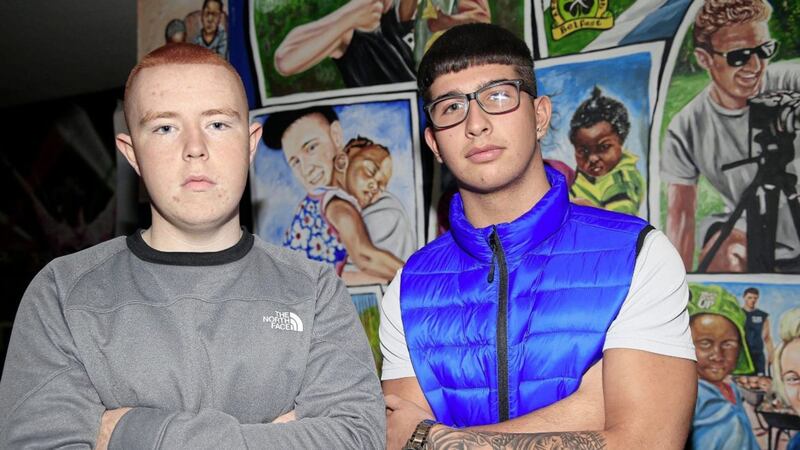IT was February 2018 and a group of teenagers were hanging out together at the Waterworks Park in north Belfast, drinking and laughing.
The Waterworks is one of two 'divided' parks within half a mile of each other in the north of the city. Nearby Alexandra Park is actually divided by a peace wall, separating Protestant and Catholic families enjoying a day out among nature.
The ugly metal gate was opened to much fanfare in September 2011, allowing access to the 'other side' during daylight hours.
At the Waterworks, the divide is more subtle. People in the area just know which is "the Catholic playground" and which is "the Protestant playground" and the partition is a porous one, with dog walkers, power walkers and cyclists roaming freely along its tree-fringed paths.
Read More: Teenagers risking their futures taking part in organised fights
It has long been a magnet for anti-social behaviour after dark, but in the weeks before that fateful February evening, underage drinking was the height of the issue.
Read More: Teen (14) 'hit with hammer and knuckle duster' during north Belfast attack
Indeed the group was made up of children from both sides of the invisible peace line. In what now seems an irony, they had become friends through cross-community projects.
Each side will now say it was the other that started the trouble.
"There was one big group of people influenced with drink and all," Gerard Wylie recalls.
Then 15 years old, he and his friends from Ardoyne had made friends with Protestant `neighbours' from the Shankill through youth programmes.
"We'd been mates with a few. We all got on."
There had been some organised fights in the area at weekends arranged through social media.
"It didn't start out as sectarian," his friend Dylan Mooney explains. "Just groups arranging to meet and fight."
The mixed group of friends were listening to music on a speaker when, according to Gerard and Dylan, "someone played Protestant songs".
"We had rebel songs and one from the Protestant side kicked up and was arguing with one of our mates, pushing him," Gerard says.
"They'd both been drinking and everyone ended up getting involved. Dylan even got a black eye from one of the people."
"He said `sorry' after," Dylan says. "He's a mate and he didn't know what he was doing."
The Catholic group chased their erstwhile Protestant friends down to the gates on the nationalist Antrim Road.
"From that night in the middle of February there was a fight every two nights a week," Dylan recalls.
"We would meet up in different places, parks and all, get big crowds and all go down and one group might have more than the other."
Things became more violent as the weeks went on, with "older people, maybe 18/19, people with cars and all" becoming involved and younger teens hanging around on the periphery.
Soon attendance did not feel optional.
"You're going because friends are going," Gerard says and Dylan agrees.
"All the friends group, people from school, would be talking about it and about going and people would didn't show - everyone (would be) against the person."
Outdoor music concerts have also been the scene of fights, with an uneasy détente at Australian DJ Timmy Trumpet's Belsonic gig last summer breaking down into violence at a Ben Nicky gig in Custom House Square.
It is obviously a dangerous environment for school children to be drawn into night after night, with weapons such as knuckledusters and `flip bats' becoming the norm.
"You'd take them more for protection. Anything can happen, you're running at them, they're running at you," Gerard says.
Injuries are rarer than they might be, with neighbourhood police units, tipped off by residents on the watch for the large groups congregating, more often than not flooding the area and scattering the youths, sometimes with the assistance of the PSNI helicopter's spotlight.
"The very last fight I was involved in up the road at the top of the shops, the police came, lots of them, and got out and went for us," Dylan says.
The fights tailed off after August's Ben Nicky gig, with the painstaking work of youth workers finally managing to get through to the main participants.
Gerard and Dylan were meanwhile among those selected to go on a trip to South Africa to meet and learn from the endemic gang culture there through the cross-community R City `Your Choice' programme.
They are still buzzing from the experience, recounting tales of being inches from witnessing a fatal drive-by shooting when a gun jammed, and teenagers riddled with bullets from more deadly gang fights where membership requires murder.
What did the experience teach them?
"Choices," they say in unison.
Dylan elaborates: "Every choice leads to a consequence, whether good or bad."
Both are now focused on their future, Dylan keen to keep studying and work in IT and Gerard with plans to be a barber.
Their last fight was in September. A month later a 14-year-old was injured after being beaten about the head and body with a knuckle duster.
The children who hovered around the periphery have moved into the vacuum left after the older boys transitioned away.
At present there seems little hope of breaking the cycle.
As Dylan says: "We could try and talk to them but they won't listen to us. We wouldn't have listened to anyone."
:: TOMORROW: How criminal gangs are preying on a generation of young people increasingly being lost to drugs.







